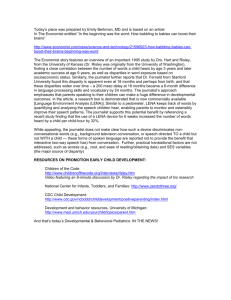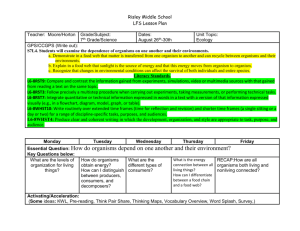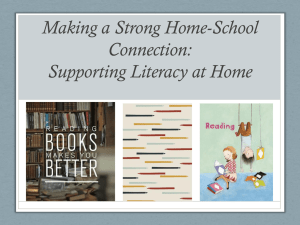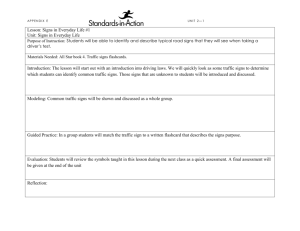English - The Program for Infant/Toddler Care
advertisement
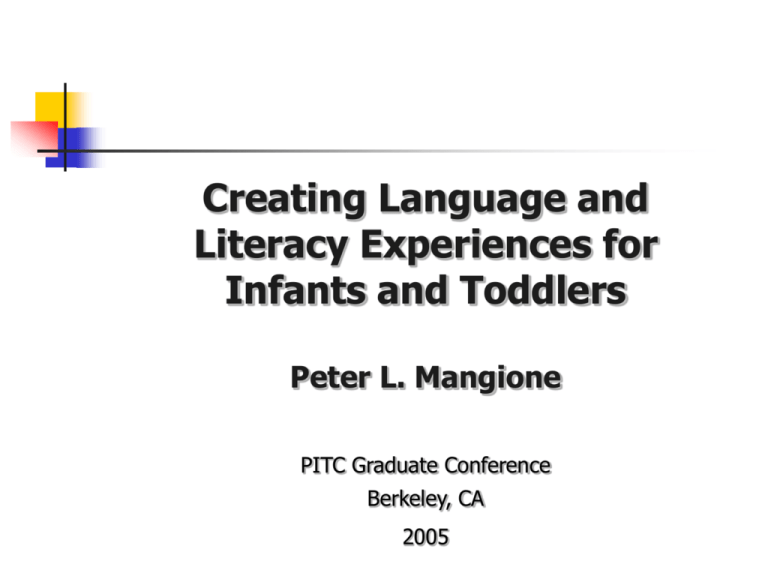
Creating Language and Literacy Experiences for Infants and Toddlers Peter L. Mangione PITC Graduate Conference Berkeley, CA 2005 VOCABULARY DEVELOPMENT Number of Words Types of Words (Variety or Diversity) Source: Pan, B. A., Rowe, M. L., Singer, D. S., & Snow, C. E. (2005). Maternal correlates of growth in toddler vocabulary production in low-income families. Child Development, Vol. 76, No. 4, 763-782. WHEN IS THE VARIETY OF VOCABULARY MOST INFLUENTIAL? The effect of maternal types [varied vocabulary] on child vocabulary production appears particularly pronounced during the early stages of language development, around 24 months of age. The effect of maternal pointing was also particularly salient during this same period. Source: Pan, B. A., Rowe, M. L., Singer, D. S., & Snow, C. E. (2005). Maternal correlates of growth in toddler vocabulary production in low-income families. Child Development, Vol. 76, No. 4, 763-782. MATERNAL OR CAREGIVER TALKATIVENESS AND CHILD’S VOCABULARY DEVELOPMENT “Maternal talkativeness did not have an independent effect on growth in vocabulary production.” Source: Pan, B. A., Rowe, M. L., Singer, D. S., & Snow, C. E. (2005). Maternal correlates of growth in toddler vocabulary production in low-income families. Child Development, Vol. 76, No. 4, 763-782. TALKATIVENESS AND VARIETY OF WORD TYPES GO HAND IN HAND Talkativeness Variety of Word Types EFFECTS OF STRESS AND DEPRESSION ON MATERNAL OR CAREGIVER TALKATIVENESS “Mothers experiencing more stress and depression talk less to their children.” Sources: Breznitz, Z., & Sherman, T. (1987). Speech patterning of natural discourse of well and depressed mothers and their young children. Child Development, 76, 395-400. Lovejoy, M. C., Graczyk, P. A., O’Hare, E., & Newman, G. (2000). Maternal depression and parenting behavior. Clinical Psychology Review, 20, 561-592. TWO KINDS OF TALK WITH BABIES Instrumental Talk (Business Talk, Contextualized Language, Here and Now) Expressive Talk (Extra Talk, Decontextualized Language, Focus includes Past and Future) “BUSINESS TALK” AS COMPARED TO “EXTRA TALK” “. . .what happens is that when you only talk a little bit, your business isn’t very fun. It’s a lot of prohibitions, very few affirmations telling you what you did was right. But in a sense, extra talk is full of affirmations; it’s all elaborations on what you just said.” Todd Risley, co-author of Meaningful differences in the everyday experiences of young American children. Source: www.childrenofthecode.org/interviews/risley.htm WITH “EXTRA TALK”, EXPANSION COMES NATURALLY OR AUTOMATICALLY “. . .that’s capitalizing on the teachable moment to expand and elaborate your child’s comment or words. That’s where the best teaching happens. It always turns out that’s an automatic part of extra talk. It doesn’t have to be taught. It’s automatically there if you’re talking about extra things that are not business.” Todd Risley, co-author of Meaningful differences in the everyday experiences of young American children. Source: www.childrenofthecode.org/interviews/risley.htm IS PROVIDING RICH LANGUAGE EXPERIENCES FOR BABIES INTENTIONAL? “. . .I don’t think it’s intentional. We haven’t seen any evidence of anybody intentionally doing anything. . . .we never saw anybody sitting down and teaching their child anything.” Todd Risley, co-author of Meaningful differences in the everyday experiences of young American children. Source: www.childrenofthecode.org/interviews/risley.htm BEING TALKATIVE IS EMBEDDED IN RESPONSIVE INTERACTION “Talking was laid onto social interaction.” Todd Risley, co-author of Meaningful differences in the everyday experiences of young American children. Source: www.childrenofthecode.org/interviews/risley.htm EVERYONE IS CAPABLE OF EMBEDDING LANGUAGE IN RESPONSIVE INTERACTION “Language is laid on that by everybody. In other words, even the most taciturn parents had moments when they were talkative. Their talkativeness had all the features, in terms of positivity and complexity, and so on, that the more talkative people had.” Todd Risley, co-author of Meaningful differences in the everyday experiences of young American children. Source: www.childrenofthecode.org/interviews/risley.htm BEING TALKATIVE IS EMBEDDED IN RESPONSIVE INTERACTION “What you can translate talkativeness into is a social ability for interaction and sustaining an interaction with the baby. And the baby, of course, is motivated by sustaining the interaction with the parent [caregiver].” Todd Risley, co-author of Meaningful differences in the everyday experiences of young American children. Source: www.childrenofthecode.org/interviews/risley.htm “SUSTAINING THE DANCE” LEADS TO COMPLEX INTERACTIONS “. . .When you’re sustaining the dance. . .the dance steps become a little more complex. But if all your dance is just one, two, start, and that’s all your interactions and dancing practice is, it’s always simple.” Todd Risley, co-author of Meaningful differences in the everyday experiences of young American children. Source: www.childrenofthecode.org/interviews/risley.htm ADDING TALKATIVENESS TO EMOTIONAL RELATIONSHIPS AND INTERACTIONS “. . . It’s the emotional relationships and interactions. But what I keep doing is telling people that what we need to do is to add the component of talkativeness.” Todd Risley, co-author of Meaningful differences in the everyday experiences of young American children. Source: www.childrenofthecode.org/interviews/risley.htm IMPORTANCE OF COHERENCE FOR INFANTS AND TODDLERS “. . .if you think about it in terms of central nervous system stimulation, you’ve got to engage kids where their lives are coherent, spending more time paying attention to things and doing coherent things. At the same time you’re getting them to overlay on top of that an additional dimension of stimulation [language].” Todd Risley, co-author of Meaningful differences in the everyday experiences of young American children. FACTORS DURING PRESCHOOL YEARS FOUND TO HAVE DIRECT EFFECTS ON LATER LITERACY DEVELOPMENT Oral Language Development Vocabulary Development Print Motivation (Interest in Print) Phonological Awareness or Phonological Sensitivity Letter Knowledge PHONOLOGICAL SENSITIVITY “These findings indicate that significant growth in phonological sensitivity occurs between 3 and 4 years of age.” Source: Lonigan, C. J., Burgess, S. R., & Anthony, J. L. (2000). Development of emergent literacy and early reading skills in preschool children: Evidence from a latentvariable longitudinal study. Developmental Psychology, Vol. 36, No. 5, 596-613. LETTER KNOWLEDGE Letter names Letter sounds Source: Lonigan, C. J., Burgess, S. R., & Anthony, J. L. (2000). Development of emergent literacy and early reading skills in preschool children: Evidence from a latent-variable longitudinal study. Developmental Psychology, Vol. 36, No. 5, 596-613. EVIDENCE SUPPORTS A SEQUENCED APPROACH TO FACILITATING EMERGENT LITERACY Oral language skills appear to provide the basis for the development of phonological processing skills Letter knowledge is critical for the development of both decoding skills and phonological sensitivity Consequently: Literacy programs for young children (i.e., 2 to 4 years) should focus mainly on improving oral language skills Letter knowledge and phonological sensitivity should be taught explicitly in the preschool and early grade school period Source: Lonigan, C. J. (March 2003). Children’s emergent literacy and family literacy. Unpublished manuscript, Florida State University. DIALOGIC READING The type of help provided to the child is keyed to: The skills already demonstrated to the child (i.e., scaffolded) Building on previous readings of the book Following the child’s interest both within a book and in choice of books Source: Lonigan, C. J. (March 2003). Children’s emergent literacy and family literacy. Unpublished manuscript, Florida State University. Language Development, Communication & Culture Key Points to Consider Acquiring language is complex. It is not taught. Infants play an active role in learning language. Under typical circumstances, infants learn language. Experience with communication and language is key. Language development varies from individual to individual and from social-cultural context to socialcultural context. Infants learn language in the context of human relationships. Experience with language typically occurs during everyday routines/activities. EARLY MESSAGES: STRATEGIES TO ENHANCE LANGUAGE DEVELOPMENT IN INFANTS AND TODDLERS Be responsive when children initiate communication Engage in nonverbal communication Use child-directed language Use self talk and parallel talk Help children expand language Support bilingual development Attend to individual development and needs Engage infants with books and stories Be playful with language Create a communication-friendly environment
